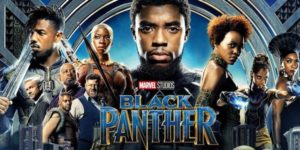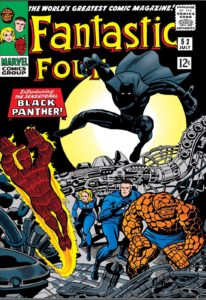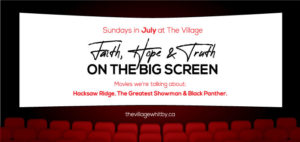 Our Third & Final movie of this July series is Black Panther…
Our Third & Final movie of this July series is Black Panther…
- This is a Marvel Movie…a Superhero Movie.
- Which means we risk blocking out an audience that isn’t into these kinds of movies so much…sorry.
- Black Panther was one of the most anticipated movies in a long time.
- They grossed more than any Marvel movie (1.3 billion)
- 1st in Superhero, 3rd in Domestic, 2nd Disney
- Why? Why all the hype? Why would we dabble with this story on a Sunday morning? What kind of connection could this possibly have with Faith, Hope & Truth.
- Let’s see. But first, a bit of the story!
- They grossed more than any Marvel movie (1.3 billion)
STORY:
 Black Panther, the character, originated in 1966, in a Marvel comic featuring the Fantastic 4. It was issue #52.
Black Panther, the character, originated in 1966, in a Marvel comic featuring the Fantastic 4. It was issue #52.
Think about it. Why 1966? These are the years of MLK, John Lewis and the civil rights movement. This was Marvel’s way to speak into the climate of the day. (on purpose or by accident). One might say that it’s just animation, or just a comic book character. Others might say it was a very clever way to invite a new audience to Marvel and speak into a broken culture in some helpful way.
The story is about a people in a third world African country called, Wakanda.
To the world, they are considered impoverished, but that is only their front. Beneath the surface, they are an advanced society in resource, technology, and more. This is all because of something called Vibranium.
They recognized what they discovered, and how their way of life contrasts the rest of the world. So what did they do? Hide it. Conceal it. Protect it.
Some background is given. King T’Chaka’s brother was sent to the US as a spy. He didn’t do too well. Instead of observing and fitting in, he was influenced by the ways of “the world”. He sold Vibranium to someone who wanted to use it for ill. King T’Chaka comes to visit, confronts him, and in the process we discover that another spy was planted, this causes the King’s brother to react, and in this conflict, the brother is killed. Sad. For him…and his son that is left behind in poor Oakland neighbourhood.
We fast forward. King T’Chaka, is now passed, due to an accident at a United Nations meeting (Marvel story). T’Challa, his son, must now become the new King of this nation.
We learn that T’Challa is a good man; a peaceful man. He is opposite of the ways of the world. He doesn’t want to wage war on others, and is able to change and see things differently than even his ancestors did.
There is a beautiful exchange in the movie between T’Challa & his father. “You’re a good man, with a good heart, and it’s hard for a good man to be King”
- this reminds me so much of CS Lewis & Narnia. Little Lucy in that story asks if Aslan is safe. And the beaver responds by saying, “Safe?” said Mr Beaver …”Who said anything about safe? ‘Course he isn’t safe. But he’s good. He’s the King, I tell you.”
- I love how this story throws us into questions of leadership and integrity. Can good people be effective leaders? YES.
The villain in this movie is Erik (or Killmonger), the boy left behind by the King T’Chaka. His circumstance, his suffering, his past, drives him to revenge. This is something both T’Challa and the people have to deal with as it forces them to face a reality they don’t like – their former King, even though his intentions were good, made a bad decision – he chose protection over care – he chose to leave his nephew to protect his people. T’Challa must be different.
- this is important to think about
- Can we move beyond the sins of our fathers/mothers?
- “You can’t let the mistakes of your father define you” (Nakia)
- Can we, respectfully acknowledge, that even though we love and appreciate who’s gone before us, we can be better.
- Perhaps some of our own stories resemble this…
The dilemma or problem to be solved in Black Panther is this:
- Your prodigal son/nephew has come home with a vengeance
- He fights for the throne
- Your good King is dethroned
- Will you continue to fight within or will you come together to be better?
- Erik, as new king, wants Wakanda to respond to his enemy’s in the same ways his enemies treated him. T’Challa says to him at one point, “You want us to become just like the people you hate”
I don’t wanna give too much of the story away, plus there’s too much in this story line to share in this format. I will say that this story ends so well.
- The King decides to purchase the buildings his uncle and cousin lived in, in Oakland, and restores the community.
- They will build the first Wakanda International Outreach Centre focusing on social outreach and sciences and technology.
- It’s like they went back to where their worst mistake was made and redeemed it…moved forward from it.
- Then, speaking at the United Nations, they say these remarkable words, “For the first time in history, we in Wakanda will be sharing our resources with the outside world. We can no longer watch from the shadows, but be an example of how we, brothers & sister on this earth should treat each other. The wise build bridges, the foolish build barriers. We must find a way to look after one another.”
INSIGHTS/APPLICATION/SCRIPTURE: (Faith, Hope, Truth)
Black Panther deals with many ISM’s (Agism, Racism, Feminism, Elitism, etc)
- this story highlights equality in all respects
- Women
- The women in the this movie are the heros
- They are strong, intelligent, confident, and leaders
- Young & Old come together. Wisdom & Work shared by all.
- Joel 2 definitely comes to mind here…
- “Then, after doing all those things,
I will pour out my Spirit upon all people.
Your sons and daughters will prophesy.
Your old men will dream dreams,
and your young men will see visions.
In those days I will pour out my Spirit
even on servants—men and women alike.
- 1 Timothy 4 as well, “Don’t let anyone think less of you because you are young. Be an example to all believers in what you say, in the way you live, in your love, your faith, and your purity.”
- “Elders” in the scripture is given to those who are not only of age, but of ilk, those who lead by example
- Colour is strength, not weakness
- Where you live really does effect your world view. We of course can be better than this.
- This movie breaks barriers…in so many ways. A BLACK movie…unapologetically…as it should be.
What do we do with what we’ve been entrusted with?
- Fight the temptation to protect what you have, and instead share what you’ve been given.
- Perspective
- It’s yours to keep
- It’s yours to use
- It’s yours to share
- The Wakanda people came to the conclusion that sharing what they have is the best way to live and to lead.
- Perspective
- In Luke 12 we read, “From everyone who has been given much, much will be demanded; and from the one who has been entrusted with much, much more will be asked.”
- There are countless other places in scripture where we are called to be generous…don’t miss out on the gift of generosity.
- Idolatry is a potential problem in this story as well. They’ve come to trust in, worship if you will, Verbranium. It’s subtle, but it’s there. Remember Jesus’ words, “you can’t worship both God & money”. These are fitting words in this context.
3 ethics reflected in this story
- T’Challa / King – justice/goodness
- Killmonger / villain – revenge/hurt
- Nakia – compassion/heart
The viewer is faced with a decision…what ethic will you live by?
This concludes our series in movies this year. Hope you enjoyed it. Each movie had something different to offer. Thank you for engaging with us and allowing us to take a different approach this month. Also, a big thanks to Wes Peel, Cheryl Romeril, and Renz Laserna, for participating in each of these conversations. They added so much to this series.
Peace & Love & Recycle!!!
